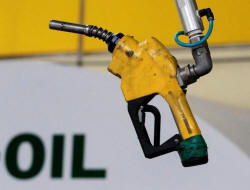South Korea fuel oil imports soar as coal, nuclear
plants shut
 Send a link to a friend
Send a link to a friend
 [March 14, 2018]
By Roslan Khasawneh and Jane Chung [March 14, 2018]
By Roslan Khasawneh and Jane Chung
SINGAPORE/SEOUL (Reuters) - South Korea's
move to shut coal-fired generators to control air pollution at the same
time as nuclear reactors are going into scheduled maintenance is
resulting in surging fuel oil imports, as utilities burn the dirty
feedstock to meet power demand.
South Korea's trade ministry said in February it would suspend five
coal-fired power plants, with a combined capacity of 2.32 gigawatts (GW),
from March to June, part of a broad campaign to reduce pollution.
That plan may backfire, at least in the short-term. A cold winter has
raised power and heating demand, forcing utilities to burn more fuel oil
in order to meet demand.
A by-product of the crude oil refining process, fuel oil's biggest use
ahead of power generation is as a shipping fuel.
"In the near-term, fuel oil imports will increase to make up for the
shortfall in coal-fired generation capacity," said Pat Markey, managing
director of consultancy Sierra Vista Resources.
Fuel oil imports by power producers into Asia's fourth largest economy
have jumped to 200,000 tonnes in March so far, up from 92,000 tonnes in
February, tender data compiled by Reuters showed.

First-quarter fuel oil imports are expected at 417,000 tonnes, up 28
percent from a year ago and already more than 60 percent of the 660,000
tonnes taken for all of last year.
Burning fuel oil for power results in lower carbon dioxide emissions
than coal-fired plants, but releases more toxic particles into the air.
"Pollutants generated during combustion of fuel oils are nitrogen
oxides, carbon monoxide, greenhouse gases, volatile compounds (like
unburned hydrocarbons) and toxic trace metals," according to the U.S.
Commission for Environmental Cooperation.
An official from a South Korean state-owned utility, said the increased
fuel oil demand was partly a result of the government's decision to halt
coal-fired plants temporarily due to pollution and reduced nuclear power
because of planned maintenance.
[to top of second column] |

A gas pump is seen hanging from the ceiling at a petrol station in
Seoul June 27, 2011. REUTERS/Jo Yong-Hak/File Photo

The official, who declined to be identified as he is not unauthorized to speak
to the media, said some 110,000 tonnes of fuel oil would be needed in April.
Only two of South Korea's major utilities, Korea East-West Power Co Ltd (EWP)
and Korea Western Power Co (WP), issue tenders for fuel oil for power
generation, mostly during peak summer and winter demand, data on Thomson Reuters
Eikon shows.
The two utilities declined to comment.
Coal power generates about 40 percent of South Korea's total electricity needs,
nuclear around 30 percent, and natural gas meets 20 percent. The rest comes from
oil and renewables.
Even with the increase in fuel oil purchases, South Korea will have to raise
imports of other fuels to meet demand as nearly half of its nuclear power plants
are down for maintenance.
Liquefied natural gas (LNG) is the most likely to fill the gaps. Thomson Reuters
Eikon data shows South Korea's LNG shipments reached nearly 12 million tonnes
between January and March 14, up 1.5 percent from the first quarter of last
year.
(Reporting by Roslan Khasawneh and Jessica Jaganathan in SINGAPORE, and Jane
Chung and Yuna Park in SEOUL; Editing by Henning Gloystein and Tom Hogue)
[© 2018 Thomson Reuters. All rights
reserved.] Copyright 2018 Reuters. All rights reserved. This material may not be published,
broadcast, rewritten or redistributed.
Thompson Reuters is solely responsible for this content.
 |